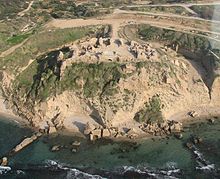- Melisende of Arsuf
-
Melisende of Arsuf Sovereign Dame of Arsuf
Lady of BeirutSpouse(s) Thierry d'Orca
John of Ibelin, the Old Lord of BeirutIssue Balian of Beirut
John of Arsuf
Raoul of Ibelin
Hugh of Ibelin (died 1238)
Baldwin of Ibelin, Seneschal of Cyprus
Guy of Ibelin, constable of Cyprus
Isabelle of IbelinFather Guy of Arsuf Mother Unknown Born before 1177 Died Unknown
Holy LandMelisende of Arsuf, Sovereign Dame of Arsuf, Lady of Beirut (born before 1177), was an heiress, and the second wife of the powerful Crusader noble John of Ibelin, the Old Lord of Beirut (1179–1236) who led the opposition to Emperor Frederick II when he tried to impose Imperial authority in the kingdom of Jerusalem and the Kingdom of Cyprus, as well as the lordship of Beirut.
She was the daughter of Guy of Arsuf. From 1177, she was Sovereign Dame of Arsuf.[1] Upon her marriage to John of Ibelin, she passed the lordship of Arsuf to her husband.
Arsuf fortress, in Israel, home of the Crusader Lords of Arsuf
Contents
Family
She was born sometime before 1177, the eldest daughter of Guy of Arsuf. Her mother's name is unknown. She had a brother, Jean, Lord of Arsuf who married Helvis de Brie. When Jean died childless, Melisende inherited the lordship of Arsuf.[2][3] She had two younger sisters whose names are not recorded. One married the Chamberlain of Antioch,[4] and the other married Adam of Antioch.,[5] by whom she had a son, John, Marshal of Antioch.
Arsuf or Arsur, as it was known by the Crusaders, was a lordship in the Kingdom of Jerusalem. Melisende's uncle, Jean of Arsuf is recorded as having subscribed the charter, in 1177, under which King Baldwin IV of Jerusalem donated property to the Church of the Holy Sepulchre.[6]
Marriages and issue
On an unknown date, Melisende married firstly Thierry d'Orca, by whom she had seven daughters, all of whom died young.[7] In 1207, she married secondly John of Ibelin, Lord of Beirut, former Constable of Jerusalem, and Regent in Acre for his half-niece Queen Maria. He was the son of Balian of Ibelin and Maria Komnene. His half-sister was Isabella, Queen of Jerusalem. Melisende was his second wife. His first wife, Helvis of Nephim, had died without leaving surviving children.
Upon their marriage, Melisende passed the lordship of Arsuf to John, increasing his territory in the Kingdom of Jerusalem. Beirut was effectively an independent state under his rule, while remaining a vassal of the Sovereign. After rebuilding the city which had been destroyed by the forces of Saladin, during the latter's conquest of the Crusader kingdom, Ibelin constructed a magnificent palace.
John of Ibelin and Melisende had six sons and one daughter:
- Balian of Ibelin (1210- 4 September 1247 Askalon), succeeded his father as Lord of Beirut. Leader of the nobility in the War of the Lombards. In 1230, he married Eschiva de Montfaucon, daughter of Walter de Montfaucon de Montbéliard and Bourgogne de Lusignan of Cyprus, by whom he had four children, including John II of Beirut.,[8] who in turn married Alice de la Roche sur l'Ognon. In 1231, Balian and Eschiva were excommunicated by Pope Gregory IX on the grounds of consanguinity. In 1239, they received a papal dispensation for their marriage.[9]
- John of Ibelin (1212- December 1258), Lord of Arsuf, Constable of Jerusalem. Married Alix of Caiphas, daughter of Rohart of Caiphas and Aiglantine of Nephim, by whom he had a son Balian, who succeeded him as Lord of Arsuf. Balian married Plaisance of Antioch.
- Raoul of Ibelin
- Hugh of Ibelin (1213–1238), led the vanguard at the Battle of Agridi in 1232.
- Baldwin of Ibelin, Seneschal of Cyprus, (died 21 February 1267), In 1246, was appointed Seneschal of Cyprus. At the Battle of Agridi, he commanded the rearguard. He married Alix, daughter of Walter III de Bethsan and Theodora Komnene Lathoumena, by whom he had six children.
- Guy of Ibelin, constable of Cyprus (c.1215- May 1255), was appointed marshal and Constable of Cyprus. He married Philippa, daughter of Aimery Berlais, by whom he had ten children, including Isabella of Ibelin, Queen consort of King Hugh III of Cyprus, by whom she had issue.
- Isabelle of Ibelin, became a nun
Legacy
Melisende died on an unknown date. Her husband John of Ibelin died in 1236 when he was crushed by his fallen horse, while on a military campaign against the Muslims.
Melisende had many descendants, some of which included Anne of Lusignan, King Charles VIII of France, Anne of France, and all of the Dukes of Savoy, beginning with Amadeus IX.
References
- ^ Women in Power (1150-1200)
- ^ Charles Cawley, Medieval Lands Jerusalem, Nobility. Foundation for Medieval Genealogy 2006-2008
- ^ Lignages d'Outremer, Marciana MS Francese 20, CC LXXXIX, p.63
- ^ Cawley, Medieval Lands Jerusalem, Nobility
- ^ Cawley, Medieval Lands Jerusalem, Nobility
- ^ Cawley, Medieval Lands Jerusalem, Nobility
- ^ Cawley, Medieval Lands Jerusalem, Nobility.
- ^ Cawley, Medieval Lands Jerusalem, Nobility
- ^ Cawley, Medieval Lands Jerusalem, Nobility
Sources
- Charles Cawley, Medieval Lands, Jerusalem, Nobility, Foundation for Medieval Genealogy 2006-2008
- Lignages d'Outremer, Marciana MS Francese 20,CCLXXXIX, p. 63
- Women in Power (1150–1200)
Categories:- 12th-century people
- Medieval women
- House of Ibelin
- Christians of the Crusades
- Women of the Crusader states
- Kingdom of Jerusalem
Wikimedia Foundation. 2010.

